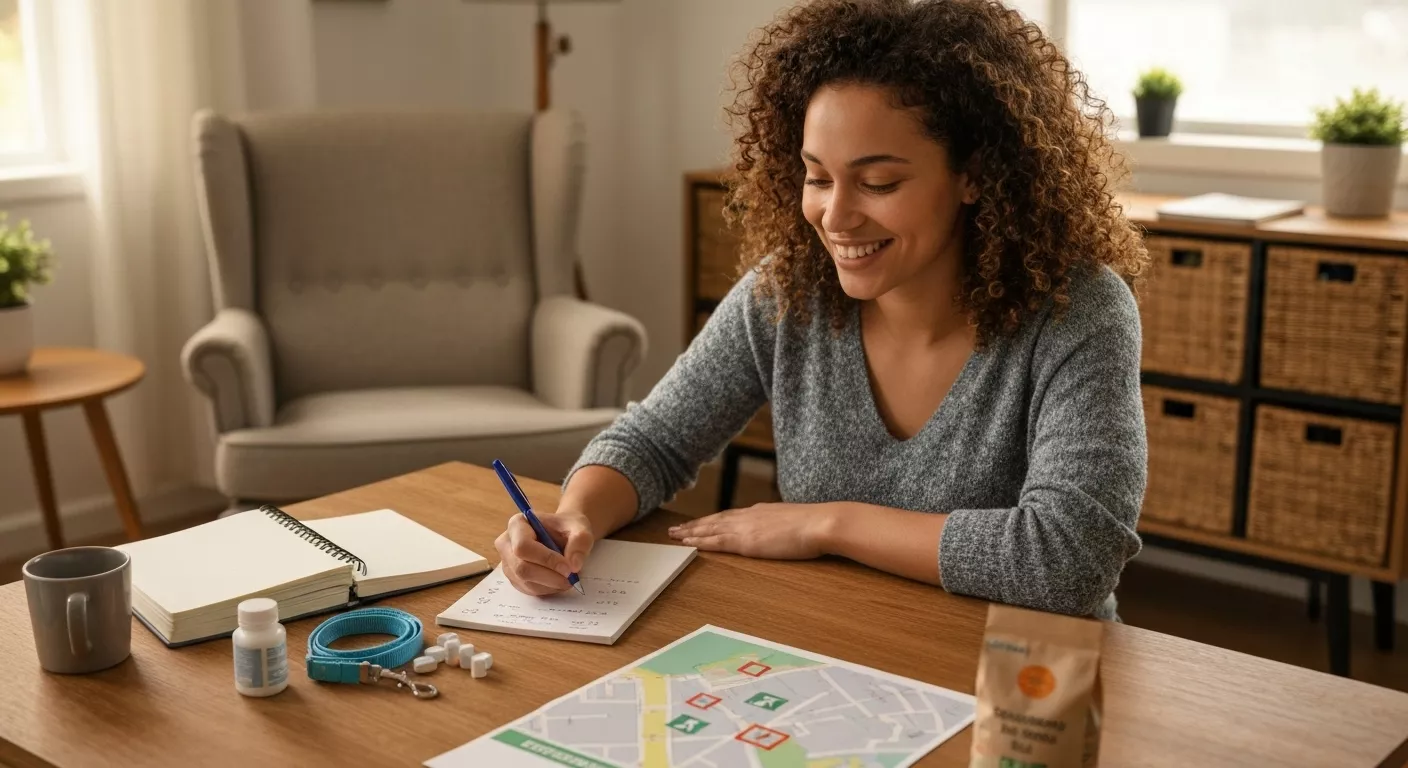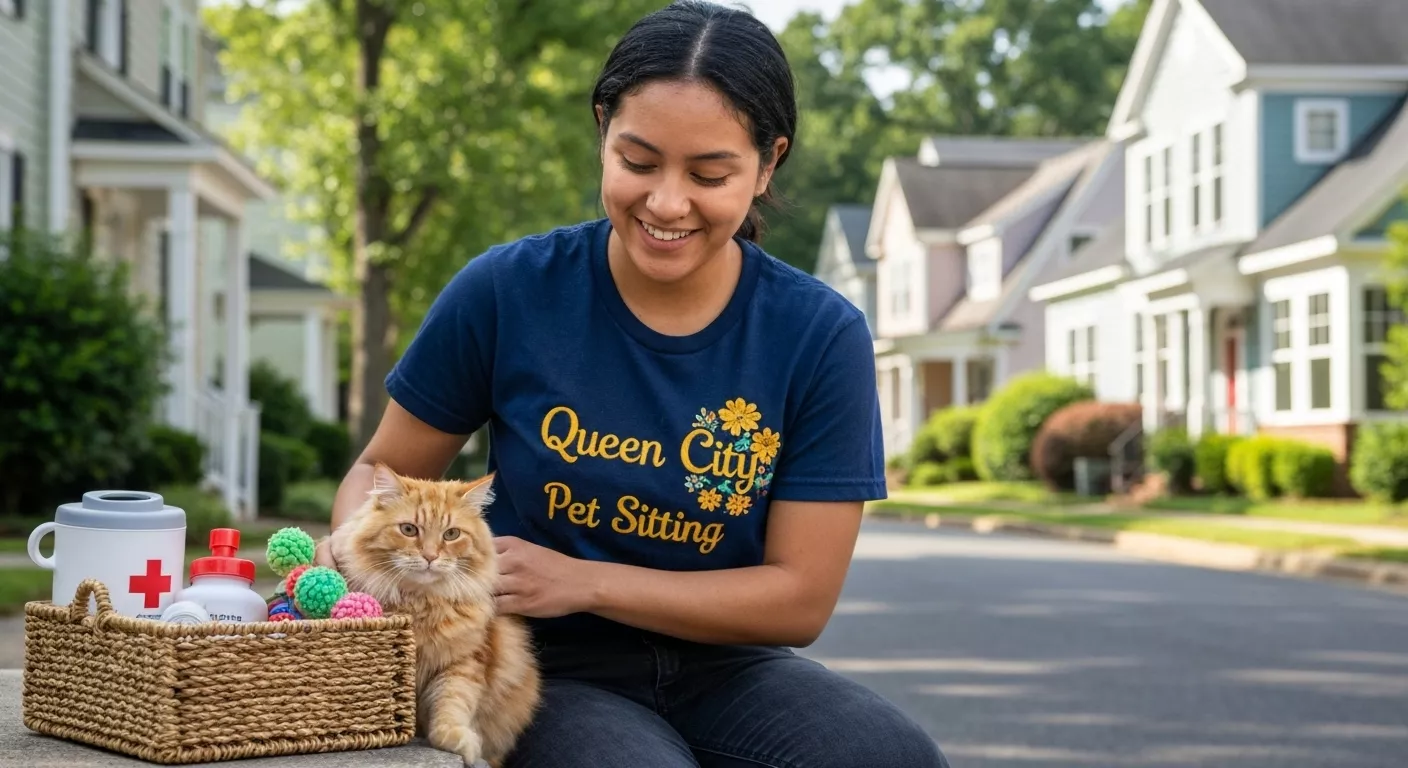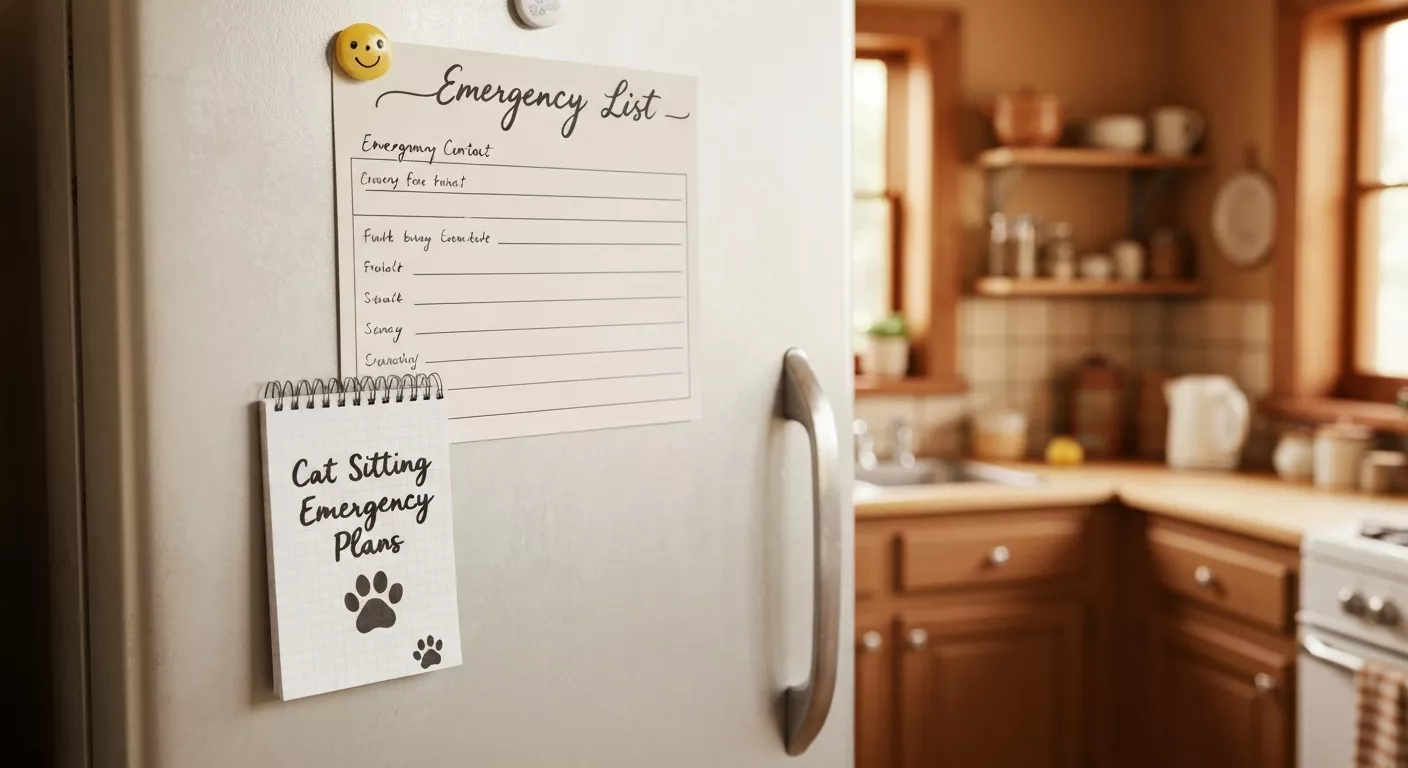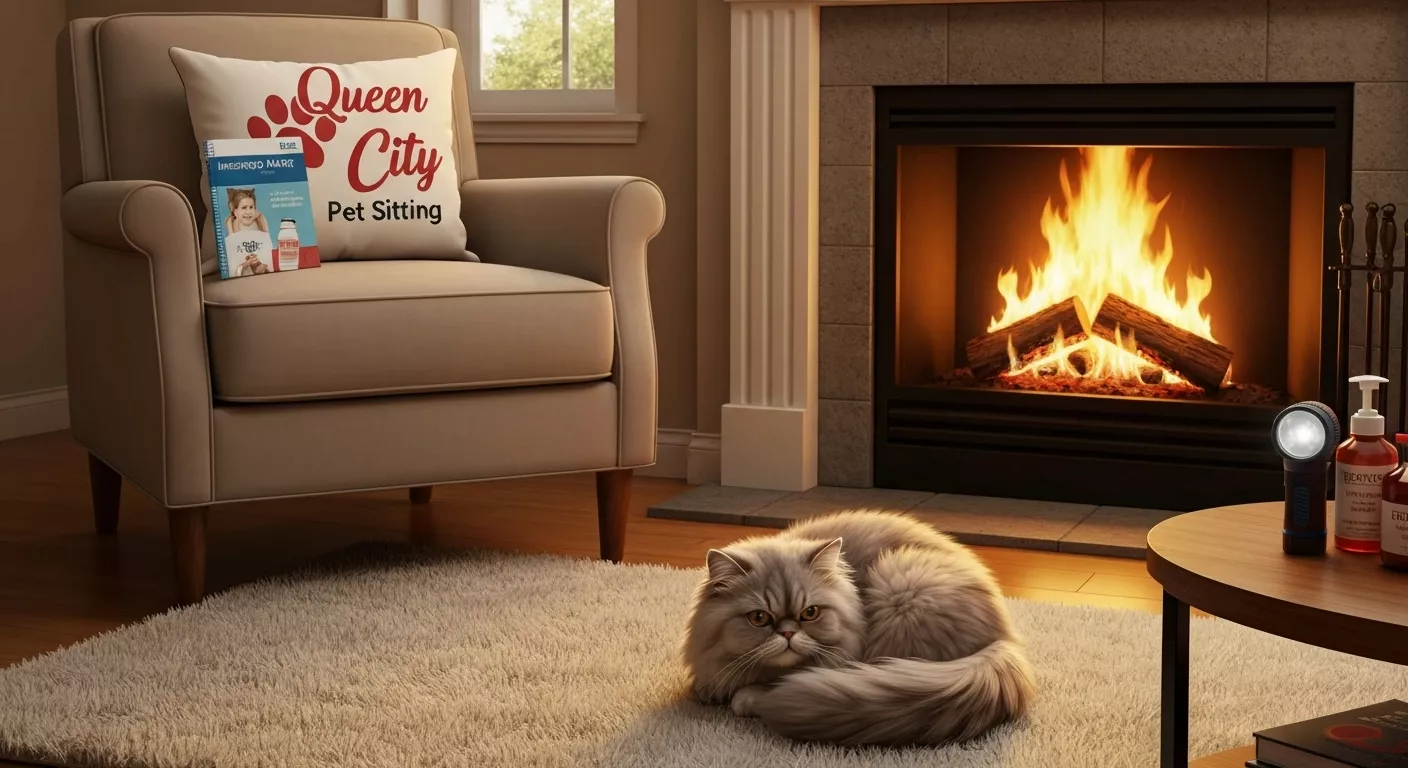Key Highlights
- Find out what parts make up a good cat sitting emergency plan for complete peace of mind.
- Learn why giving your cat sitter detailed contact info and vet details is so important for your pet’s safety.
- See why it matters to check that a cat sitter is trained in emergency preparedness.
- Find out how Queen City Pet Sitting works with pet owners to build a care plan just right for your cat.
- Get simple steps to get your home and cat ready before your pet sitting starts.
- See a list of important Charlotte emergency resources to add to your emergency plan.
Introduction
Planning a trip should feel fun and exciting. But, many people with a furry friend feel worried about leaving their cat at home. You might wonder what will happen if something goes wrong.
Having an emergency plan for your pet care is the best way to feel good when you are away. If you work with a cat sitter who knows what to do in an emergency, your cat will be in good hands.
This guide will help you make an emergency plan for your cat. You will feel peace of mind knowing your cat and their care are all set while you are not at home.
Core Elements of a Robust Cat Sitting Emergency Plan

A good emergency plan means more than just putting a phone number on the fridge. It gives your cat sitter all the important details they need to help your pet right away and feel sure about what to do in any situation.
A strong plan has clear and simple information for everything that might come up, like health problems or things that happen in the house. This way, there is no guessing, and your cat sitter can keep taking care of your pet without any trouble.
Your emergency plan needs to list contact information for your friends or family, your vet, and the local clinics. Be sure to write out clear steps and permissions for your pet’s care. The text below will show you what details you should give your sitter to help make a strong emergency plan and keep your pet safe.
Essential Contact Information to Provide Your Sitter
When there is an emergency, time is very important. One of the most important things that pet owners can do is to give the pet sitter a clear list of emergency contact information.
Make sure this contact information is easy to find. You can keep it in a binder or share it in a digital file, so the pet sitter can get to it right away.
Make sure your contact sheet is clear and easy to read. It should have your contact details. You should also add more backup contacts. What if you are on a plane or somewhere with no service? Having other contacts who know they may get a call means someone can always be reached.
Your emergency contact information sheet needs to have:
- Your Cell Phone Number(s): Add your phone number and details about your travel plans.
- Emergency Contacts: List at least two people you trust. They should live close by, have a key to your home, and be able to decide things for you if needed.
- Your Veterinarian: Write down the clinic’s name, address, contact information, and when it is open.
- Local 24/7 Animal Emergency Hospital: Add the name and contact information of the closest animal hospital that is open at all hours.
Make sure you include the contact information for all emergency contacts to help if something comes up.
Medical Records and Veterinary Authorization Steps
Along with giving your sitter contact numbers, you need to make sure they have all the info and power needed to get veterinary care for your cat’s medical needs.
Good emergency preparedness is about sorting out vet visit details ahead of time. This helps stop any hold-up for care and lets your sitter put all their attention on your pet.
Before you leave, reach out to your veterinarian’s office. Tell them that a professional sitter will watch your cat. Give permission for them to treat your cat in case of emergency.
Some vets ask for a signed letter of authorization, so be sure to provide that if needed. It’s also smart to leave a credit card with the clinic. This helps cover any costs and makes sure there are no money problems if something urgent happens.
To make sure your sitter has all they need, give them:
- You should have your cat’s medical records, like papers that show vaccine history and any health problems the cat has.
- A signed note that says your pet sitter can say yes to any veterinary care if needed.
- Check that your vet already has your payment details saved.
Vetting Professional Cat Sitters for Emergency Readiness

Not every cat sitter gives the same level of care, especially if there is an emergency. A neighbor or friend may be good for quick visits, but a professional cat sitter is different.
A real pro has training and follows set rules for emergency preparedness. When you look for a sitter, you want someone who has thought about what could go wrong. It is important that they have a plan ready for any problem that comes up.
Groups such as Pet Sitters International help make rules for people who take care of pets. A sitter who has years of experience knows what to do in different situations.
You should try to find someone who stays calm and knows what to do when there is a problem with your pet. Next, you will read about the main things to check for, like their training and the papers they should have.
Background Checks, Insurance, and Bonding
Trust is at the heart of pet sitting. When you let someone in your home, you must feel sure about their honesty and the way they work. This is why background checks, insurance, and bonding can’t be skipped when you pick a professional sitter. A full background check helps you feel safe, as it shows the person in your home is trustworthy and has not broken the law.
Insurance and bonding help keep you safe. Liability insurance keeps you from paying money if the worst happens, like if something in your home gets damaged or if your cat needs care because of an accident.
Bonding keeps you safe if there is theft. A professional sitter will tell you about what coverage they have. They will feel good about showing you proof so your pet has the best chance to feel safe and secure.
| Credential | Hobby Sitter | Professional Sitter (like Queen City Pet Sitting) |
|---|---|---|
| Background Check | Unlikely | Standard procedure for all team members. |
| Liability Insurance | No | Yes, covers accidents and property damage. |
| Bonding | No | Yes, protects against theft for your peace of mind. |
Certifications and Specialized Emergency Training
If a cat starts choking or has an allergic reaction, a sitter has to act right away. A sitter who has special training knows what to do in these moments.
Having a first aid or pet first aid certificate shows that the person is ready for emergencies and sets them apart from others. The training helps sitters learn how to look at the problem, keep the pet safe, and use life-saving steps until a vet can help. Emergency preparedness is important for taking care of pets.
This skill is more than basic pet care. A trained sitter knows how to spot small changes that show if a pet is upset or not feeling well. An untrained person might not see these things. This way of working is one of the best practices in pet care. It can make a big difference if there is an emergency.
Look for a sitter who has training or certificates in these areas:
- Pet First Aid & CPR: You can use first aid for pets to take care of urgent health problems like choking or heavy bleeding. It is good to know how to help in these moments.
- Cat Behavior: Knowing why cats feel stress, anxiety, or act out helps you control and take care of their feelings and actions.
- Medication Administration: Learning how to give pills, liquids, or shots right makes sure your pet gets the medicine they need.
Preparing Your Home and Multi-Cat Household for Emergencies

Your work in emergency preparedness starts in your own home. A space that is ready helps a sitter take care of your cat in the right way. It also helps them feel sure if something goes wrong.
This means more for homes With more than one cat because cats Sometimes feel stress around other cats. A change or a new person can make some cats feel upset. That stress could make a cat act differently or feel sick.
By getting the supplies ready and giving clear directions, you help your sitter do a good job. This makes it easy for your cat to feel safe and calm, which can lower their separation anxiety. There are tips below to help you organize what your cat needs and look after your home when you have more than one cat.
Accessible Emergency Supplies and Cat Care Instructions
Before you go, make sure to put all cat care things and emergency supplies in one place. Try to choose a spot that is easy to get to. This spot will be a “command center” for your sitter. Doing this makes it simple for them to find what they need.
You do not want them searching around in a panic if a problem comes up, or if they just need something for daily cat care. Your sitter will feel better and be ready to help your cat, both for everyday needs and emergencies. This is extra important for overnight stays.
Along with the supplies, it is good to leave a clear set of instructions. In this paper, write about the feeding times, how to take care of the litter box, and any medicine your cat might need.
Be sure to talk about your cat’s personality, and what he or she usually likes to do. Let the sitter know if there is a favorite hiding spot or a toy that your cat loves.
When you share these notes, the sitter can follow your ways. They will be able to see sooner if your cat acts strange or if anything in the home does not feel right.
Your emergency supply station should include:
- A strong and easy-to-use cat carrier for each one of your cats.
- A pet first-aid kit.
- Extra food, water, and litter.
- Cleaning items to help with any possible messes.
Tips for Minimizing Stress in Multi-Cat Environments
Looking after more than one cat at home can be hard because their moods often affect each other. When one gets upset or stressed, the others can feel it too.
The best thing to do for a comforted kitty is to stick with their usual schedule for feeding and play as much as you can. A professional sitter can help keep things running smoothly by using your clear tips on what to feed, when to feed, and how to play with the cats.
For cats that have special needs or the ones that get into fights, easy steps can help them feel better. You can feed these cats in different rooms, so they will not fight over food.
It is also a good idea to put out enough litter boxes. A good rule is to have one litter box for each cat, and add one more. this helps stop fighting over space and will calm them down.
To help the sitter feel at ease with the cats, do these things.
- Maintain Routines: Try to keep feeding times the same each day. Regular play sessions also help to make life feel normal.
- Provide Separate Resources: Make sure to use more than one feeding spot. Give plenty of litter boxes so the cats do not feel like they have to fight for them.
- Offer Hiding Spots: Let every cat have at least one safe place. A quiet spot to go when they feel stressed can help them feel better.
Queen City Pet Sitting: Our Emergency Preparedness Protocols

At Queen City Pet Sitting, the safety of your pet is our main focus. We do not just give a pet sitting service; we build a bond with you that is based on trust.
We also take emergency preparedness very seriously. We know that choosing to leave your Charlotte pet with someone else is a big step. Our careful steps are made to help you feel calm and sure that your cat is with people who care for it and know what they are doing.
Our approach is to act early. When you get in touch with us, we start working right away. We create an emergency plan that fits what your cat needs.
We think getting ready ahead of time can stop a lot of problems and help us act fast if something happens. The next sections show how we work with you as the owner. You will also see what steps we take when there is an emergency.
How Queen City Pet Sitting Partners With Owners
Our process starts with working together. We know that pet owners know the most about their animals. The things you tell us help us build the best care plan for your pet.
In our free consultation, we make sure to listen to all your instructions and any special requests. This is the time for us to learn everything we need about your cat, like what treats they like and what health history they have.
This way of working as partners helps us see that everything is done the way you want. We make a plan with you that shows what needs to happen every day and what to do if there is a problem.
Queen City Pet Sitting writes down all parts of this plan, so when the pet sitter visits, they know your cat well. The sitter will read about your cat’s likes and needs and see what you ask for about care. That way, you feel sure your cat is cared for, thanks to pet sitting from Queen City Pet Sitting.
When we work together, we make sure to talk openly and trust each other. This helps us look at every part of your cat’s life. In the end, the care we give will match what you and your family need.
Key Procedures We Follow During an Emergency Situation
In an emergency, you need a clear plan that people practice. Our sitters know the right steps to keep your pet safe and will let you know what is going on.
They know what to do and they stay calm while they check the situation to see how urgent it is. Our team can handle small cuts or very serious medical problems. Your pet will be in good hands with us.
Once we know the pet’s needs, we act fast. We often call your veterinarian or a nearby emergency clinic to get help from a professional. At the same time, we get in touch with you and your emergency contacts to give updates. Our aim is to handle things well, so you have complete peace of mind.
Our emergency protocol includes:
- Assess and Stabilize: We look at the pet’s condition right away. If the pet needs help, we give first aid as soon as we can.
- Communicate: We reach out to you and your emergency contacts. We also talk to your vet to get advice.
- Transport: We make sure your pet gets moved safely to the veterinarian or animal hospital that is set for more care.
Educating Your Sitter: What to Cover Before You Leave
The first meeting with your pet sitter is a good time for you to share everything you know about your cat. As cat parents, you be the person who knows all about your pet’s habits and what it needs.
Use this meeting to go over each part of caring for your cat. Make sure to talk about everything so there is no confusion. This first talk is important. It helps the pet sitter know what to do and keeps your cat safe and happy while you are away.
This talk should not be just about when your cat eats. Make sure you talk about your cat’s personality, worries, and health background too. When you give your sitter all this information, they can give better care that fits your cat’s needs.
You will also get detailed updates that show they really know your pet. The next parts will show you what topics you should talk about in this important talk.
Defining Roles, Responsibilities, and Contingency Plans
A big part of teaching your sitter is to be clear about roles and what everyone should do. Talk about what needs to happen in case something does not go as planned, so both you and the sitter understand things well.
For example, go over what the sitter should do if the lights go out. Also, share what the sitter must do if they cannot reach your main emergency contact.
Thinking about these things before helps you avoid panic and confusion when a real emergency happens. You should talk about who has the power to spend money for veterinary care and who can make choices if you can’t be reached. When you set clear rules and instructions, your sitter can give the best care to your pet without any worry or delay.
Your contingency plan discussion should include:
- Decision-Making Hierarchy: If you are not around, say who gives the final word. This could be one emergency contact to get in touch with.
- Financial Limits: There will be a set amount that can go toward emergency veterinary care.
- Household Issues: Give steps for what to do for things like power going out, water starting to leak, or alarms going off.
Sharing Allergies, Medications, and Behavior Notes
The small things can really help with your cat’s comfort and safety. Make sure to give your sitter clear notes about your cat’s allergies, medicine, and how your cat acts.
Is your cat allergic to some foods or does it react to certain cleaners? These details are important for keeping your cat safe and to stop health problems.
For your cat’s medications, the instructions you give should be very clear. Write down the amount, the time to give it, and the way to give it. For example, you might need to put it in food or use a pill box. This is even more important if you have a senior cat or one that is sick for a long time.
It is also good to share behavior notes. Tell your sitter about your cat’s favorite toys, where they like to hide, and what makes them feel scared. This way, the sitter can better understand how your cat acts. It helps them win trust and watch for any problems with your cat’s health.
Your detailed notes should cover:
- A complete list of any known allergies.
- Specific instructions for all medications.
- Notes on what the pet usually does, like their favorite hiding spots and how they show stress.
- Information about their favorite toys and what ways they like to play.
Navigating Veterinary and Local Pet emergency Resources in Charlotte
When your pet has an emergency, the most important thing is to know where to get help. If you live in the Charlotte area, it helps to get to know the places that offer veterinary care.
You and your sitter should both know these spots. Be sure to have the contact info for your usual vet. You also need to know how to reach 24/7 emergency clinics in the area for those times when your pet needs care after normal hours or on holidays.
Having emergency contacts ready can save a lot of time when it matters the most. A professional sitter in North Carolina may know some of these places, but giving them a list of your clinics helps make sure they do what you want. The next parts will list good places to call and show how your sitter talks to them.
Recommended Animal Hospitals and 24-Hour Clinics
Charlotte has many good animal hospitals and emergency clinics. These places offer veterinary care all day and nights. It is a good idea to put the names, addresses, and phone numbers of one or two clinics in your emergency preparedness plan. This helps your sitter know where to go quickly if there is a problem or an emergency.
Before you go on a trip, check which clinic is near your home. It helps to know how to get there. Some people also sign up their pets at an emergency hospital before a problem happens.
This makes check-in faster and easier if there is an emergency. Doing this gives your cat the best care quickly. It is one of the simplest things you can do for their health.
Here are some good emergency vet clinics in the Charlotte area.
- CARE (Charlotte Animal Referral & Emergency): This is a well-known hospital that helps with special pet problems. It also gives emergency care all day and night.
- Carolina Veterinary Specialists: They offer emergency care at several places in and around Charlotte, so you can find help for your pet nearby.
- UrgentVet Pet Clinic: This clinic is for pets who need quick care. If your pet cannot wait to see a regular vet, you can go here for help.
How Sitters Communicate With Local Emergency Services
In an emergency, a good cat sitter will be there to help your cat. The cat sitter will give the vet your contact information, your cat’s medical history, and the signed papers for treatment.
A good cat sitter talks in a clear way with the vet about what is going on. The cat sitter wants the vet to understand the problem, so your cat can get the right care. The cat sitter acts as your pet’s helper and the main person that emergency services reach out to about your cat.
A professional sitter knows how important it is to give you the right information. They will tell you what happened before the emergency. They also will talk about the signs or symptoms they saw.
A professional sitter will let you know any steps or instructions you gave them. They will get regular updates from the vet staff. After that, they will give these regular updates to you.
During a vet visit, a professional sitter will:
- Give the vet all the papers and info you have that show your cat’s health history.
- Tell the vet about the emergency and what kind of symptoms your cat has.
- Be the one to talk with the vet staff, so you and they know what is going on at all times.
Cat Sitting Contingency Strategies for Pet Owners
In the end, making a good emergency plan for your cat when you have a cat sitter is key to keeping your pet safe and giving you peace of mind.
When you give clear contact information, needed vet permissions, and simple care steps, you help your cat sitter handle any problem that comes up.
If you choose Queen City Pet Sitting, you are working with a pet sitting service that puts emergency preparedness first. This way, you can relax and feel at ease while you are gone. If you want to feel secure about your cat’s care and safety, contact Queen City Pet Sitting today for a free consultation!


Leave a Reply
You must be logged in to post a comment.